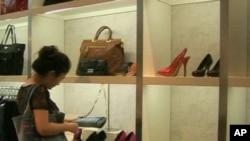Besides overtaking Japan as the world's second largest economy, China's rapid economic growth is changing everything from the global balance of military and financial power to the way cars are designed. It's also resulted in an increase in the luxury goods market in China, expected to top $14 billion in the next five years. Mil Arcega has more.
It is a wardrobe closet that would have been unthinkable in Mao's China. But Xie Xiaoya is going to a cocktail party and she says she needs the right shoes and the right handbag to go with her Valentino evening dress.
The Beijing advertising executive earns about $73,000 a year. She says she spends at least one third of that on luxury goods such as dresses, watches and expensive handbags.
For Xie, it is an important part of her image. "Brands bring to people a kind of self-confidence and social recognition," she said.
While much of the world is mired in recession, sales of luxury goods in China have increased 30 percent.
Jean-Michel Dumont, who heads a public relations firm in Asia, says that last year Chinese consumers spent $9.4 billion on luxury goods, surpassing the U.S. to become the second biggest luxury market after Japan. "So, this is really a reflection of society change, the economic trends of China as a whole. And in fact there is definitely a willingness of the Chinese consumers today to really go to the luxury segment of consumption," he said.
The growing demand for luxury goods is very profitable for stores such as Lenux that offers Prada, Gucci, Fendi and other high end brands.
Store manager Ge Zing says the company has opened two stores in two years. "You can see that almost all the luxury brands are suffering from a shrinking market in all parts of the world except China, where the market is still growing. Therefore we are very confident and that's why we decided to open the store in China," he said.
The confidence is also reflected in a recent survey that shows that Chinese consumers expect to spend nearly 15 billion dollars on luxury items over the next five years.
Economist David Resler says the trend in Chinese consumerism is one of the bright spots for Western economies. "They're becoming modern economies. And that means they need to import goods from the developed economies like those in Europe and those in the United States," he said.
Despite the new-found confidence in a booming China, economists say the wealth gap between the Chinese elite and the poor majority is among the most extreme.
Although China is home to a growing number of millionaires, average per capita income for its 1.3 billion citizens is still among the lowest in the developing world.




